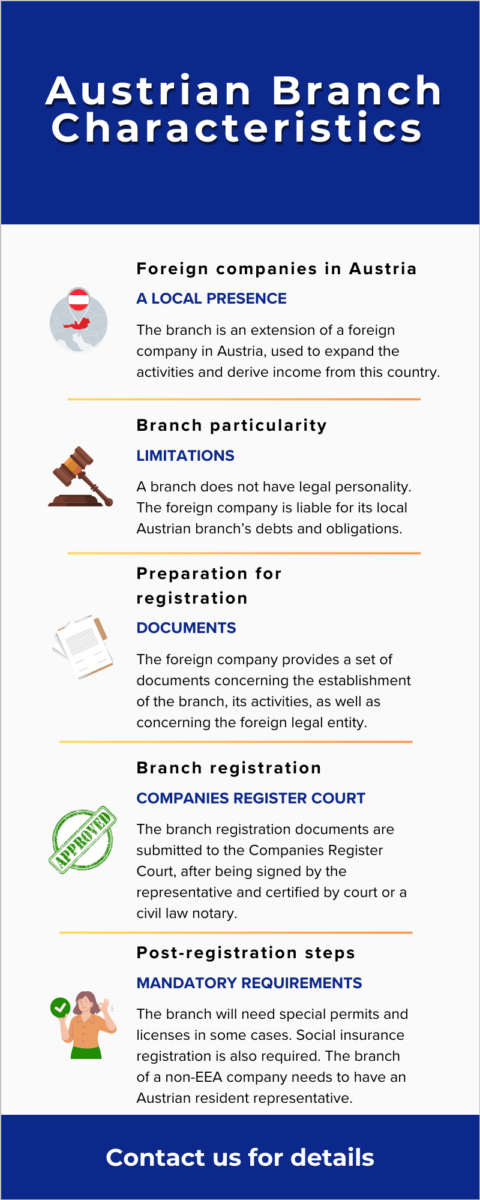Establishing a branch in Austria (Zweigniederlassung Osterreich) or a branch in Vienna (Zweigniederlassung Wien) is not a very difficult process. The Austrian government is trying to encourage foreign investments by having just a few registration requirements and not having a discriminatory policy for foreign investors. A branch in Austria, even though is not considered a legal entity, has the same rights and obligations as any registered legal entity in Austria.
| Quick Facts | |
|---|---|
| Applicable legislation | For foreign countries |
| Best used for | Highly regulated activities, such as banking, insurance, financial operations |
| Minimum share capital | No |
| Time frame for the incorporation (approx.) | Approx. 7 weeks |
| Management | Local for non-EU and non-EEA companies |
| Legal representative required | Yes, for non-EU and non-EEA enterprises |
| Local bank account | Yes, but not mandatory |
| Independence from the parent company | Dependent on the parent company |
| Liability of the parent company | Full liability on the branch office’s debt and obligations |
| Corporate tax rate | 24% on profits obtained in Austria |
| Possibility of hiring local staff | Yes |
Understanding the particularities of the branch office, as well as the requirements that apply in terms of business licenses and tax liability, is essential before establishing this type of operation. Our team offers complete assistance for the set-up of an Austrian branch. Below, our company formation agents in Austria explain the registration procedure for a branch office. They can also help you open a company in Austria, no matter its type.
Table of Contents
Characteristics of Austrian branch offices
In order to be considered a branch office, a company registered under the Austrian Company Law must:
- be a permanent establishment and represent the interests of a foreign company in Austria;
- depend on the parent company when it comes to the activities it undertakes in Austria;
- bear the same name as the parent company and be registered with the Austrian Trade Register;
- foreign companies outside the EU and EEA must appoint a local representative for their branches.
Perhaps the most important particularity of the branch is that this business form is merely an extension of a foreign company. It is not a separate legal entity with legal capacity, and it remains dependent on the parent company abroad (the foreign company also being liable for the debts and obligations incurred by its Austrian extension).
The branch does, however, operate with local management (it has a locally appointed branch manager). For foreign companies that have their main place of business in an EEA country, there is no requirement to appoint a permanent representative who has his habitual residence in Austria.
As opposed to the representative office, which can be used for non-commercial and market research activities, the branch is set up for purposes that are long-term, not only temporary.
Although the branch’s name needs to include the name of the foreign company, it can also include the suffix “branch”, which will be used to indicate its status. The requirement for maintaining the same name as the parent company is obligatory, and our team can give you more details about how you can verify the availability of the name.
An advantage of the branch is that the foreign company abroad can open one or more such extensions in Austria (as fitting for its business operations in the country) at generally lower costs than would be needed to set up one or more subsidiaries. Receiving ongoing assistance during the branch setup process is important for foreign companies, and it is not uncommon for a local representative to be employed for the purpose of making the needed filings with the Austrian authorities and acting on behalf of the foreign company and its interests of expanding the business operations in the country. Our local agents can act as representatives when opening an Austrian branch office.
Requirements for opening a branch office in Austria in 2024
A basic requirement to operate a branch in Austria in 2024 is having a registered office here that may be physical or virtual.
Before starting any commercial activities, the parent company’s representatives must submit at the Companies Register specific documents notarized and translated into German:
- a copy of the foreign company’s registration certificate, issued by the Trade Register in its home country;
- the articles of incorporation or the memorandum of association of the branch office;
- the certificate of good standing of the foreign company, issued by the Trade Register;
- the minutes of the management board’s meeting presenting the decision of opening a branch;
- the address of the branch’s registered office in the Austrian city where it will operate;
- the branch’s representative (not necessarily an Austrian resident).
These documents must be submitted shortly after the decision to incorporate the branch. Both paper-form and electronic applications are permitted, however, we advise applicants to seek assistance from our team regarding the electronic legal transactions and how this process takes place in Austria (by means of a transmitting agency through which the needed submissions can be made to the court in an electronic manner).
Registering an Austrian branch will also include a set of mandatory fees, payable to the authorities. They include the data entry fee of 9.40 Each for entering the name, the registered office, and the business address of the branch in the official companies register. Moreover, on a case-by-case basis, the Companies Register Court can also ask for additional fees that will be charged to the applicant.
In 2024, after registering with the Commercial Registry, the branch created in Austria must also apply for registration for VAT, even though the tax authorities were already announced about the new incorporation.
Our company registration advisors in Austria can help with the preparation of the documents needed to submit to the Companies Register.
We invite you to watch a video about the Austrian branch:
Branch taxation in Austria
We remind interested foreign companies that the main taxes for companies applicable in 2024 (which also apply to branches) are the following:
- 24%: the corporate income tax rate;
- 24% withholding tax on dividends (unless the company receiving the dividend payment holds at least 10% of the shares of the company distributing the dividends); a different rate applies to dividend payments to resident individuals;
- 20% value-added tax; reduced rates of 10% and 13% also apply, and some types of goods and services are subject to 0% (such as exports);
- social security contributions, given the fact that the branch will have employees in Austria; these can vary, however, the employer’s contribution can amount to 21.03% of the salary paid to the employee, up to a certain monthly cap.
The Austrian branch will also need to register for social security purposes, as well as with a competent health insurance carrier. This is done before the branch employees start work. Additional information on this mandatory registration of employees (which is performed online as a requirement) can be provided upon request by our local team.
Other procedures when opening an Austrian branch in 2024
A bank account must be opened by the foreign company in the name of the branch. For this, the foreign company’s representative must come in person to Austria.
We remind foreign investors of the particularities of the branch and the fact that when a foreign company administers a branch in Austria, it remains fully responsible for the branch’s acts and the representative of the branch may be liable for the tax debts.
The Austrian branch will need to apply for a business license with the authorities in the area in which it will operate. Trade registration is mandatory and it can be performed online, however, we advise applicants to reach out to us during this step for information on the registration and the use of a card-based Citizen Card.
A branch that meets the trade licensing requirements can start its activities from the day on which the registration was made (in most cases).
Even though it is not considered a legal entity, the same taxes must be paid, and annual accounts must be filed every year. Also, VAT returns must be submitted every month or quarterly. The financial statements of the foreign company must be submitted to the Companies Register. Annual audits are necessary for this type of business.
The double taxation agreements signed between Austria and other countries prevent the taxation of cross-border operations both in Austria and in the parent company’s country of origin.
Branch tax compliance is easier with the help of our Austrian accountants. We provide foreign investors with complete assistance for tax compliance in the case of branches, as these business forms are taxed in much the same way as Austrian corporations. We can also guide branch managers on the conditions applicable to keeping the books and records outside of Austria.
Austrian business statistics
Our team highlights several interesting data about businesses in Austria:
- In 2021, the number of registered enterprises was 589,615;
- The same year, these businesses were employing a total of 3,590,035 individuals;
- The business turnover for the year 2021 was 894.0 billion EUR;
- According to the business sector, the following number of businesses were in place in 2021 in some of the most important industries: 30,851 companies were active in the manufacturing sector, 40,438 in construction, 46,840 in accommodation and food services, 91,868 companies in the professional, scientific, and technical activities sector, as well as 79,776 companies activating in human health and social work.
For more information about opening a branch, you may contact our specialists in company formation in Austria.



